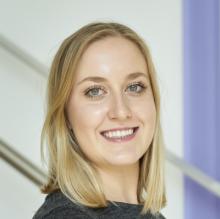Brook Hadwen
Why did you decide to pursue a graduate degree?
During my Master's degree I noticed that much of healthcare and health research is focused on disease treatment and recovery, which while this is a very important research, I particularly wanted to further explore primary prevention methods to reduce risk of poor physical and mental health. While it has been determined that health behaviors such as physical activity can significantly reduce risk of poor health, much of the population remains physically inactive. Through research, I wanted to further understand why vulnerable populations, such as adults with adverse childhood experiences, are physically inactive, which could lead to development of interventions to improve health behaviors and lower risk for disease.
Why did you decide to study at UBC?
UBC's Kinesiology department is ranked first in Canada and fourth globally, with esteemed faculty members to work with and learn from. After reading some of the top-notch research that the department conducted, I couldn’t wait to be a part of it.
What is it specifically, that your program offers, that attracted you?
Having such a high ranking, I knew that the students and research within the Kinesiology department would be held to high standards, motivating me to learn and grow as a researcher as much as possible during my PhD.
What was the best surprise about UBC or life in Vancouver?
How much UBC cares about it's community! There are so many amazing resources to enhance the wellbeing of students, staff, faculty, and other community members.
What aspect of your graduate program do you enjoy the most or are looking forward to with the greatest curiosity?
I'm looking forward to beginning the studies that I proposed for my CGS-D award. Having put a lot of thought into these studies, I'm excited to see them come to life.
What aspects of your life or career before now have best prepared you for your UBC graduate program?
My Master's degree in Epidemiology and Biostatistics helped me to understand the fundamentals of research (e.g. designing a study, statistical analysis, writing a manuscript), which I now get to apply those skills to the research I will conduct during my PhD.
What do you like to do for fun or relaxation?
Exploring BC has been what I look forward to when not in the lab. Whether that's hiking, kayaking, or just going to the beach, it always makes me feel thankful to live in such a beautiful place.
What advice do you have for new graduate students?
My advice would be to seek out as many opportunities to learn as possible. Don't wait for learning opportunities to fall in your lap. If you see a project you'd like to help with, reach out and ask! If you have the opportunity to be a part of something, do it! Learning as much as possible, from as many people as possible, will help you to form connections with colleagues that will last even beyond graduate school.
